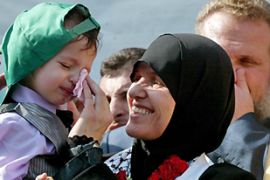Israel releases Palestinian women
Nineteen female detainees are freed in return for video of captured Israeli soldier.

“Today is like a huge party,” said Nisrin Hamdan, 26, as she waited outside Ofer military camp with several of her children, all wearing T-shirts bearing a picture of their 60-year-old mother, held for assisting a suicide bomber.
“My mother has been absent for seven years and today we will have her in our home.”
Also among those awaiting their loved ones was Nawal Hossein, 37, an aunt of a 22-year-old prisoner who was serving a 20-month sentence for plotting to become a suicide bomber.
Deal plea
Odeh said the one-minute video received in the exchange by Israeli officials was seen as proof of life for its captured soldier, Gilad Shalit.
| In depth | ||
|
Ayman Mohyeldin, Al Jazeera’s correspondent in Jerusalem, said the recording had been viewed by Shalit’s family and they gave authority for it to be released. It was later aired on Israeli TV.
In the video, Shalit is shown pointing to the date on a newspaper – September 14 2009 – confirming who he is and giving his ID number.
“I read the newspaper with the goal of finding … any information about my release and return home soon,” Shalit said on the recording.
“I hope that the current government led by Binyamin Netanyahu will not waste now the opportunity to reach a deal, as a result of which I will be finally able to fulfil my dream and be released.”
Breakthrough
The exchange deal marks a breakthrough in nearly three years of Egyptian-brokered negotiations between Israel and Hamas over the soldier. German mediators joined the talks in July.
“In the eyes of the Palestinian people this is a significant public relations victory.
It supports those that make the point that through armed resistance Palestinians can achieve tangible results, Al Jazeera’s correspondent said.
|
“By taking military measures … they can then negotiate the release of thousands of Palestinian prisoners who to some extent have not been released through the peace process.
“For the Israelis there will be a scene of confidence that indeed the Israeli government is committed to securing the release of this Israeli soldier. But at what price it is not known.”
Shalit was seized by fighters from Hamas and allied groups during a raid on an Israeli border base in 2006.
Until Friday, the only signs of life from Shalit have been several letters and an audio recording. Only one of the letters – written three months after his capture – has been released, just last month. Hamas has not allowed the Red Cross to visit the soldier.
Hamas is demanding that Israel release hundreds of prisoners, many of whom are serving lengthy sentences for attacks on Israelis, in exchange for the soldier.
Speaking at the release of the prisoners, Ismail Haniya, the Hamas leader in the Gaza Strip, said: “Today is a great day for our nation. Many martyrs are not here with us now, but their legacy is not lost, and today the Palestinians celebrate the price of their sacrifices.
“Today’s deal will be called the deal of our liberated prisoners. We would also like to remember the 11,000 prisoners still in Israeli jails.”
Re-assimilation process
Al Jazeera’s correspondent in Ramallah said there were great scenes of celebration there but that it will be extremely difficult for the women to adjust.
“Experts say they will need a long process of therapy and re-assimilation, not just to the new circumstances but to living without limitation [of life in prison], ” she said.
“We have been hearing a lot of reports about mistreatment of these women. Human rights activists and experts in dealing with victims of torture have told us they intend to speak to these ladies and see if they need help.
“The fear is that most, if not all of them, will need some sort of expert help before they make the adjustment.
Currently, more than 10,000 Palestinian prisoners remain behind Israeli bars. The Palestinian Liberation Organisation, the Palestinian Authority and Hamas all insist there can be no peace deal with Israel before all these prisoners are freed.

 Video: Final Shalit deal uncertain
Video: Final Shalit deal uncertain 